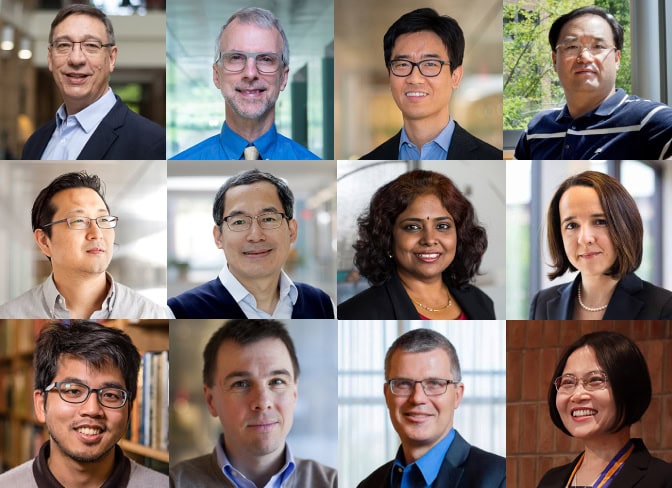
Twelve faculty members earn named professorships this year
Michigan Engineering faculty recognized for their exceptional achievements.

Michigan Engineering faculty recognized for their exceptional achievements.
From revolutionizing cancer treatment to shaping the future of flight and powering next-gen electronics, Michigan Engineering faculty are working at the edge of what’s possible. Named professorships are an important way that Michigan Engineering and the University honor distinguished faculty members for their outstanding contributions in transforming industries, advancing knowledge and changing lives. In the 2024-2025 academic year, the following faculty members received this honor for their exceptional contributions in research, teaching and service.
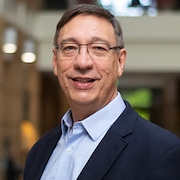
Francois-Xavier Bagnoud Professor of Aerospace Engineering
With over 400 publications as archival journal and conference papers, Carlos E. Cesnik is a leader in aerospace engineering, receiving over 20 various awards and accolades both from the University of Michigan and internationally. Cesnik’s work has focused on computational and experimental aeroelasticity of very flexible aircraft; coupled nonlinear aeroelasticity and flight dynamic response in high-altitude long-endurance (HALE) aircraft and advanced jet transport aircraft; aerothermoelastic modeling, analysis and simulation of hypersonic vehicles; and active vibration and noise reductions in helicopters.
Read more about Cesnik’s professorship
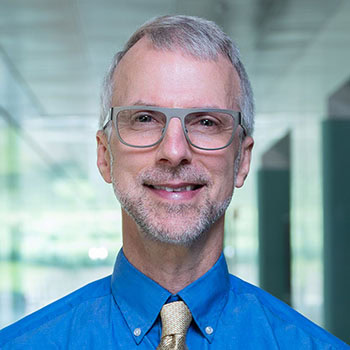
William L. Root Distinguished University Professor of Electrical Engineering and Computer Science
Jeff Fessler has had a far-reaching impact on the health of countless patients by improving medical imaging techniques in the fields of Magnetic Resonance Imaging (MRI), X-ray Computed Tomography (X-ray CT), and radionuclide imaging (PET/SPECT). His research group has made these technologies faster, safer and more cost effective, without sacrificing image quality. Methods developed by his group have also benefited other signal processing and wireless communication applications. His devotion to educating students has resulted in new courses and textbooks, as well as numerous teaching awards.
Read more about Fessler’s professorship
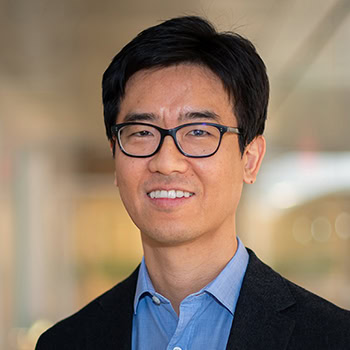
Samuel H. Fuller Early Career Professor of Electrical and Computer Engineering
Hun-Seok Kim is a world leader in efficient algorithm and very-large-scale integration (VLSI) design for wireless communication, signal processing, and artificial intelligence. He has spearheaded several projects to bring the physical and digital worlds together, consistently improving the efficiency, size, and performance of sensing, computing, and communication devices.
Read more about Kim’s professorship
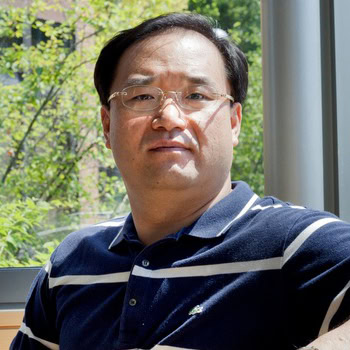
Raoul Kopelman Collegiate Professor of Science and Engineering
Jinsang Kim is an expert in a broad range of areas, including plastic electronics, self-signal amplifying molecular biosensors, highly emissive organic emitters, high-performance polymers and bioinspired soft materials. Through rational molecular design and elaborated chemical synthesis and device fabrication, he established various molecular design principles of novel functional organic and polymeric systems for smart sensors, displays and plastic electronics.
Read more about Kim’s professorship
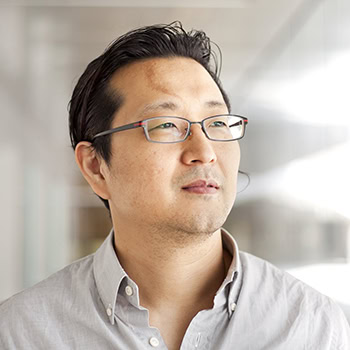
Robert B. Harris Collegiate Professor of Civil and Environmental Engineering
Drawing on multiple disciplines, such as physiology, biomechanics, psychology and behavioral science, SangHyun Lee has made outstanding contributions in improving the performance of people through technologies like robotics, automation, AI and wearables to promote safe and inclusive construction and built environments. His research combines an in-depth understanding of humans with an interdisciplinary perspective in construction.
Read more about Lee’s professorship
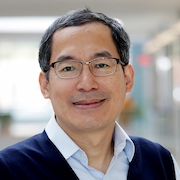
Pallab K. Bhattacharya Collegiate Professor of Engineering
Zetian Mi is a worldwide leader in new materials and processes for next-generation microelectronic and optoelectronic devices, displays, clean fuels and more. His research focuses on the investigation of (ultra)wide bandgap semiconductors and their applications in electronic, photonic, clean energy, and quantum devices and systems. Two of his current research programs focus on the use of solar energy to generate clean chemicals and fuels through artificial photosynthesis, and on ferroelectric semiconductors that could lead to next-generation microelectronic devices and circuits.
Read more about Mi’s professorship
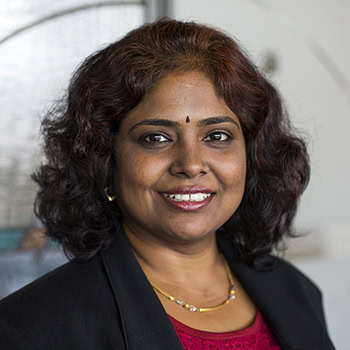
Dwight F. Benton Professor of Chemical Engineering
Sunitha Nagrath’s research aims to bring the next generation of engineering tools to patient care, especially in cancer. Her major focus of research is to develop advanced microelectromechanical systems (MEMS) tools for understanding cell trafficking in cancer through isolation, characterization and study of circulating cells in peripheral blood of cancer patients.
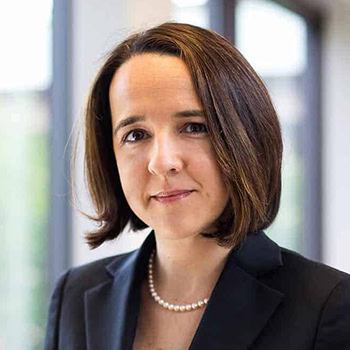
Donald C. Graham Professor of Engineering
Sara A. Pozzi is internationally recognized for her research in radiation detection and nuclear nonproliferation. She leads the Detection for Nuclear Nonproliferation Group and is the director of the Consortium for Monitoring, Technology, and Verification, a multi-institutional effort supported by the National Nuclear Security Administration. Throughout her career, Pozzi has advanced the science of radiation detection systems, particularly for applications in nuclear security.
Read more about Pozzi’s professorship
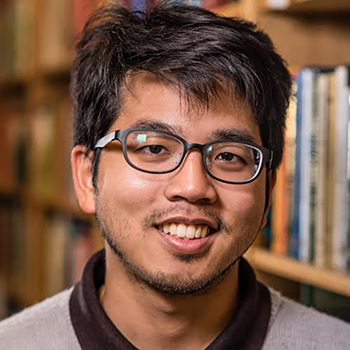
Morris Wellman Faculty Development Assistant Professor of Computer Science and Engineering
Thatchaphol Saranurak’s research explores how to make graph algorithms faster and more efficient. He is particularly interested in ensuring that these algorithms can adapt quickly to changes in data, work well on local sections of large datasets, and can be effectively utilized across distributed computing environments. His work addresses challenging problems in this area, such as creating robust algorithms that can withstand adversarial updates and developing continuous optimization techniques to solve complex combinatorial problems.
Read more about Saranurak’s professorship
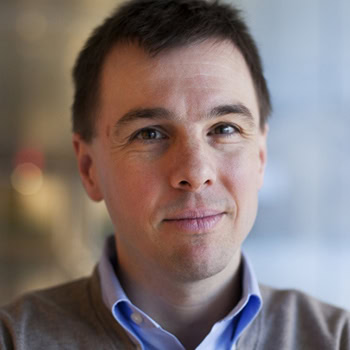
J. Reid and Polly Anderson Professor of Manufacturing
Steven J. Skerlos pioneered the application of supercritical CO2 coolants for machining, boosting production rates in manufacturing while cutting energy, costs, hazardous chemicals and waste. His entrepreneurial ventures, including three U-M spinouts, underscore his commitment to moving research to practice. As an Arthur F. Thurnau Professor and faculty director at the Center for Socially Engaged Engineering & Design, he prepares future engineers to integrate sustainability and entrepreneurship into advanced technology.
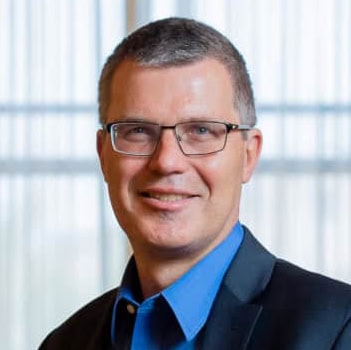
Bernard J. Lucci Professorship in Chemical Engineering
Throughout his career, Michael J. Solomon has been a pioneering figure in soft matter and colloidal systems, exploring how microscopic structures impact material properties. His group’s research has advanced rheology, particularly in understanding colloidal gels and the applications of anisotropic colloids in sustainable materials and energy management. He is also recognized for his work on microbial biofilm rheology and for developing influential microscopy techniques.
Read more about Solomon’s professorship
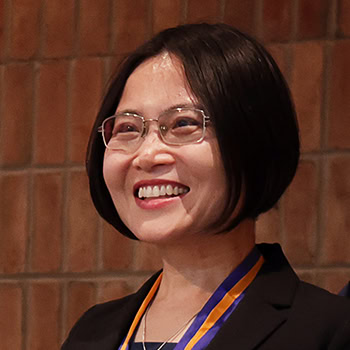
Li Ka Shing Professor of Biomedical Engineering
Zhen Xu’s work, particularly in the development of the non-invasive cancer treatment known as histotripsy, has been transformative. Histotripsy uses pulsed sound waves externally delivered to create forces strong enough to destroy tissue at cellular and sub-cellular levels. This innovative approach is revolutionizing liver tumor treatment and is poised to extend benefits to other locations in the body, including kidney and pancreatic tumors.
Read more about Xu’s professorship